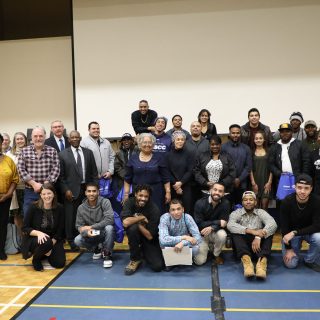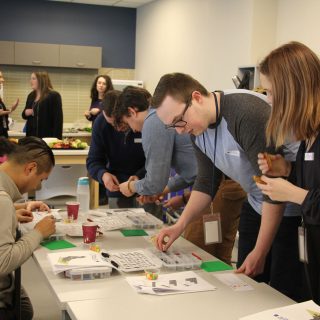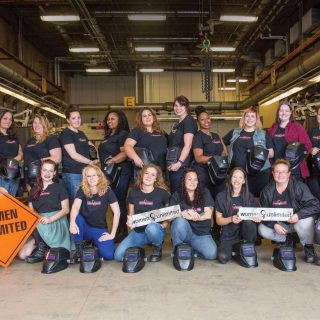Our Stories
December 7, 2016 was a celebration for the 19 students enrolled in the Pathways to Shipbuilding Indigenous Education and Apprenticeship Pilot Program. The program will not only educate, but support the students with the knowledge, resources and skills they need to work in the shipbuilding industry.
The students have just completed a 14-week customized introductory session in collaboration with the Mi’kmaw Native Friendship Centre and the Nova Scotia Community College, (NSCC). In January, students will begin the two-year metal fabrication program at the NSCC Akerley Campus. Instructors and industry supporters will continue to work to teach and mentor the students as they learn their craft and work together to achieve their trade certification.
As a program that offers an in-depth education, a strong community atmosphere, and a promising career path, students were easily attracted to Pathways to Shipbuilding.
“I’m looking forward to getting another trade under my belt, so I can get a good job, and support my family,” said Jamie Sanipass from the Elsipogtog First Nation community in New Brunswick. “I’m a licensed machinist. I have experience working with steel – I like working with steel. I’m just looking for somewhere that will help me to work out my career.”
Pathways to Shipbuilding was derived from the model of Women Unlimited, which provides trades training and career support for under and un-employed women in Nova Scotia. These women undertook an on-site training program in the fields of welding and metal fabrication. The initiative proved to be successful, and it was customized to fit the needs of Indigenous students on their path to a career in shipbuilding.
These programs are ultimately designed to provide opportunities to these under-represented yet extremely skilled groups. As the shipbuilding industry continues to thrive, it is important to find ways to help ensure all Canadians benefit from the jobs created in the growing sector. Individually and collectively, these students are, and will be, a vital asset to ensure long-term sustainability and growth throughout industry.
This initiative was made possible through the strong and rewarding partnership between Irving Shipbuilding Inc., GE Canada, Unifor, Nova Scotia Community College, Indigenous and Northern Affairs Canada (INAC), Employment and Social Development Canada (ESDC), Aboriginal Affairs (OAA), the Nova Scotia Apprenticeship Agency, and Labour and Advanced Education (LAE).
Quotes from our Partners:
Honourable Judy M. Foote, Minister of Public Services and Procurement Canada:
“One of the goals of Canada’s National Shipbuilding Strategy is to rejuvenate our marine industry, support Canadian technological innovation, and bring jobs and prosperity to many communities across Canada. Initiatives such as the Pathways to Shipbuilding Indigenous Education and Apprenticeship Pilot Project is helping to create much-needed jobs that will benefit the establishment of a strong and sustainable shipbuilding industry in Canada.”
Honourable Kelly Regan, Minister of Labour and Advanced Education and Minister responsible for the Apprenticeship Agency:
“This is a great example of the success that can come from government, industry, and community partners working together. The Pathways to Shipbuilding program creates opportunities for aboriginal young people to enter the shipbuilding industry, so they can train toward apprenticeships and successful careers here in the province.”
Don Bureaux, President Nova Scotia Community College:
“It is an honour to be a part of this incredible partnership that is fostering a tremendous opportunity for a class of determined students who will have the chance to invest the skills and education they receive back into the success of this significant Canadian project.”
Kevin McCoy, President of Irving Shipbuilding
“Pathways to Shipbuilding is an exciting part of our workforce strategy that increases trades specific skills and creates long-term metal fabrication career opportunities for Indigenous Canadians. Our work at the Halifax Shipyard building ships for Canada as part of the National Shipbuilding Strategy will increase our workforce by 1,000 shipbuilders over the next five to ten years. It is important that we seek out the best talent from all across the country. Good luck to the students as they begin their metal fabrication training.”
Jamie Sanipass, Elsipogtog First Nation, New Brunswick Student, Pathways to Shipbuilding:
“I think one of the coolest things about it is just the size of the program. They didn’t just look for people in one city or one province, there are people in our class from New Brunswick, Prince Edward Island, Nova Scotia and Newfoundland. You can tell they put in the time to find the right people for the program.”
Kim Warburton, VP, Communications & Public Affairs, GE Canada:
“GE is proud to be a part of the Pathways to Shipbuilding initiative, a unique 2-year collaborative program, combining academic and hands-on learning. Congratulations to all participants for achieving the first program milestone.”
Pam Gloade, Executive Director, Friendship Centre
“The Pathways to Shipbuilding program is a great example of communities and organizations coming together to create opportunities for Indigenous people in our region. Our staff have enjoyed working with and supporting the students as they prepare for their training, and we will be there to support them as they work hard to become proud Indigenous marine fabricators and shipbuilders.”
Bob Orr, Unifor National Secretary-Treasurer:
“As the union representing workers at the Halifax Shipyard, Unifor is very pleased to be part of the Pathways to Shipbuilding project and we extend our most enthusiastic congratulations to the students as they move on to the next phase in their training. This program can be a model for unions, employers and governments in every region of the country as we work towards more inclusive workplaces and to provide opportunities to First Nations and Aboriginal workers.”


